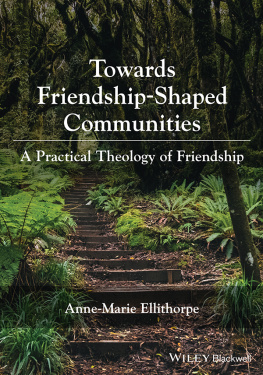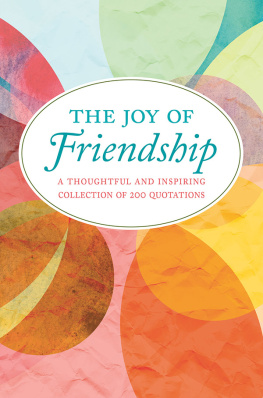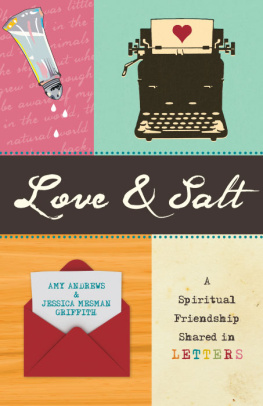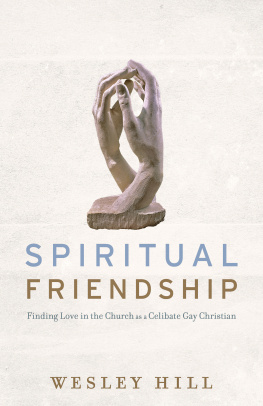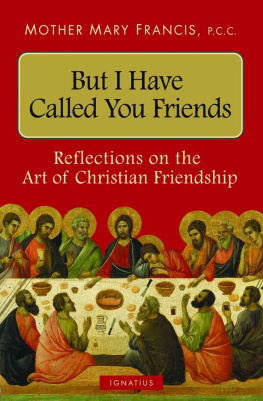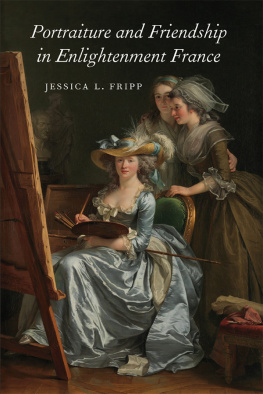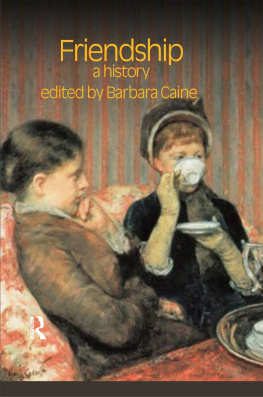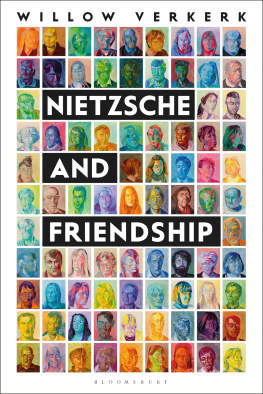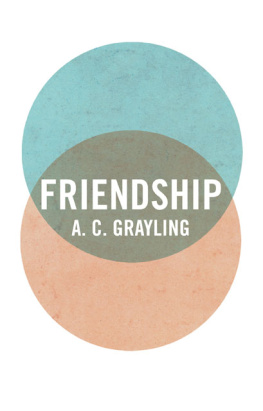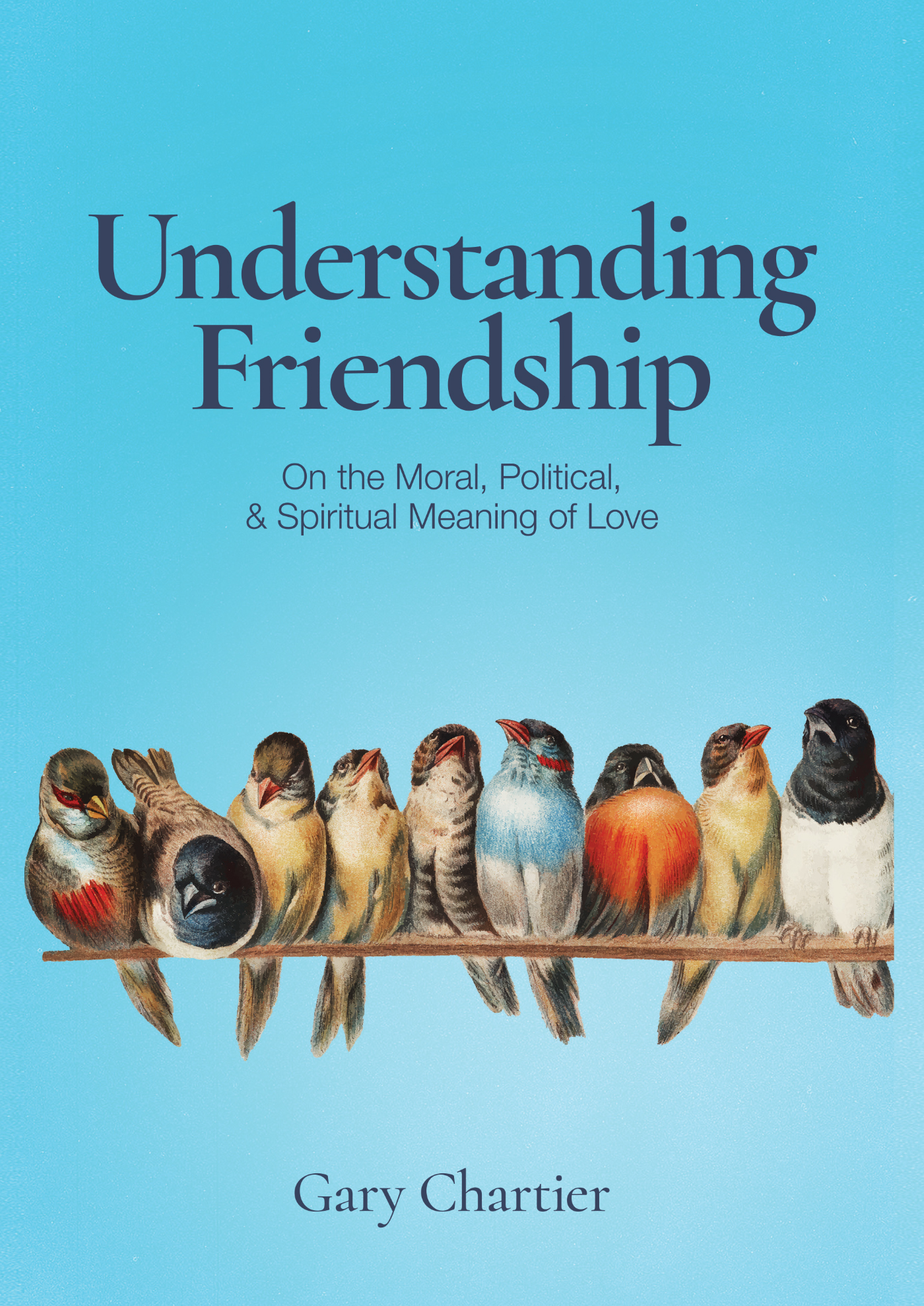
Praise for Understanding Friendship
Gary Chartiers new book, Understanding Friendship, is the most exciting and profound study on the topic that we have seen in three decades, since the youthful days of Gilbert Meilaender, Stanley Hauerwas, and Paul Wadell. Chartier presents the most diligent and comprehensive discussion that I have ever read, and he takes us to new levels of analysis throughout. His engagement with politics and economics breaks new ground and makes friendship the most important heuristic key for solving the problems of our modern times. Bravo. A sure classic from the get-go.
S TEPHEN G . P OST , Stony Brook University
Wide-ranging in its exploration of the literature of friendship, Gary Chartiers Understanding Friendship invites serious reflection about how we ought to live. Chartier examines the nature, the importance, and the limits of friendship from ethical, political, and theological perspectives. Few readers are likely to agree with every claim he makes, but through engaging his discussion, any reader can come to appreciate more fully the ways in which friendship enriches human life.
G ILBERT C . M EILAENDER , Valparaiso University
Gary Chartier offers a rich set of reflections about the most essential of human relationshipsfriendship. His insights are rooted in the classical Western ethical tradition and at the same time creatively addressed to our culture today. At a time when true friendship has been more and more replaced by transactional relationships, Chartier offers ancient wisdom that speaks to our deepest longings as social animals. His poignant reflections on vulnerability and contingency need to be heard by every thoughtful person.
S TEPHEN J . P OPE , Boston College
In Understanding Friendship, Gary Chartier invites the reader on a journey to explore the mystery, richness, and blessed possibilities of relationships we frequently take for granted but clearly cannot live well without. He is a most trustworthy and insightful guide who, along the way, deftly demonstrates not only why the love, acceptance, and support that are given and received in friendships are integral to a flourishing and fulfilling life, but also why affirming, protecting, and celebrating good friendships help create and sustain healthy and just societies. Drawing upon theology and philosophy as well as psychology, economics, and social and political theory, Chartier gives a compelling and inspiring account for why friendship matters and deserves greater scholarly attention. Best of all, in opening up the many dimensions of friendship, Chartier, like a good friend, makes Understanding Friendship a gift to a most grateful reader.
P AUL W ADELL , St. Norbert College
In this wise, wide-ranging, and philosophically astute treatment of friendship, Gary Chartier offers what precious few theologians have dared in the modern period: an account of friendship that does not begin by trying to update Aristotle. We are offered instead a marvelously stimulating proposal: that friendship is vulnerable co-creation, an opening of oneself to embrace life with beloved people one cannot control.
B RIAN B ROCK , University of Aberdeen
Understanding Friendship
Understanding Friendship
On the Moral, Political, and Spiritual Meaning of Love
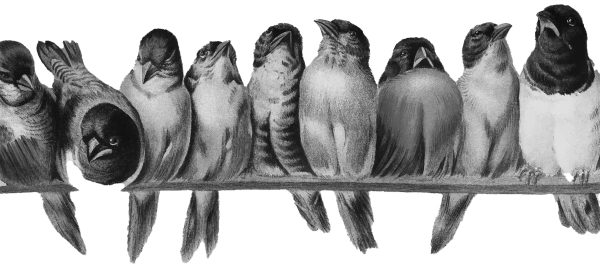
Gary Chartier
Fortress Press
Minneapolis
UNDERSTANDING FRIENDSHIP
On the Moral, Political, and Spiritual Meaning of Love
Copyright 2022 Fortress Press, an imprint of 1517 Media. All rights reserved. Except for brief quotations in critical articles or reviews, no part of this book may be reproduced in any manner without prior written permission from the publisher. Email or write Permissions, Fortress Press, PO Box 1209, Minneapolis, MN 55440-1209.
Scripture quotations are from the New Revised Standard Version of the Bible, copyright 1989 by the Division of Christian Education of the National Council of the Churches of Christ in the USA and used by permission. All rights reserved.
Portions of chapters 4, 5, and 6 are adapted from Gary Chartier, Loving Friends and Loving God, Spectrum 27.4 (Aut. 1999): 1122, and from Gary Chartier, The Analogy of Love (New York: Griffin 2017, 2020). Used by permission.
Cover image: A Perch of Birds (1880) by Hector Giacomelli (1822-1904). Digitally enhanced by rawpixel.
Cover design: Brice Hemmer
Print ISBN: 978-1-5064-7908-8
eBook ISBN: 978-1-5064-7909-5
While the author and 1517 Media have confirmed that all references to website addresses (URLs) were accurate at the time of writing, URLs may have expired or changed since the manuscript was prepared.
For Alicia
A degree of simplicity, and of undisguised confidence, which, to uninterested observers, would almost border on weakness, is the charm, nay the essence of love or friendship, all the bewitching graces of childhood again appearing.
Mary Wollstonecraft, Letters Written during a Short Residence in Sweden, Norway, and Denmark
Having a multitude of friends causes disunion, separation, and divergence, since, by calling one hither and thither, and transferring ones attention now to this person, now to that, it does not permit any blending or close attachment of goodwill to take place in the intimacy which moulds itself about friendship and takes enduring form.
Plutarch, On Having Many Friends
Perhaps the greatest element of friendship is faithfulness. To know that there is some one who will be always the same to us, who has a deep and abiding affection for us, to whom in time of trial we may turn for advice or help, adds greatly to the security and happiness of life.
Benjamin Jowett, Sermons on Faith and Doctrine
I hate the idea of causes, and if I had to choose between betraying my country and betraying my friend I hope I should have the guts to betray my country.
E. M. Forster, What I Believe
There is nothing contrary to the spirit of the Gospel, nothing inconsistent with the fulness of Christian love, in having our affections directed in an especial way towards certain objects, towards those whom the circumstances of our past life, or some peculiarities of character, have endeared to us.
John Henry Newman, Parochial and Plain Sermons
Contents
Ive managed to complete Understanding Friendship thanks to innumerable conversations and connections.
Thanks are due, as always, to the usual suspectsA. Ligia Radoias, Aena Prakash, Annette Bryson, Alexander Lian, Alicia Homer, Andrew Howe, Carole Pateman, Charles Teel Jr., Craig R. Kinzer, David B. Hoppe, David Gordon, David R. Larson, Deborah K. Dunn, Donna Carlson, Eddy Palacios, Elaine Claire von Keudell, Elenor L. Webb, Eva Pascal, Fritz Guy, Gen Mensale, Jeffrey Cassidy, Joel Wilson, John Thomas, Julio C. Muoz, Kenneth A. Dickey, Lal Welsh, Lawrence T. Geraty, Linn Marie Tonstad, Maria Zlateva, Melissa Cushman, Michael Orlando, Nabil Abu-Assal, Nicole Regina, Patricia M. Cabrera, Roderick Tracy Long, Roger E. Rustad Jr., Ronel Harvey, Ruth E. E. Burke, Sel J. Hwahng, Sheldon Richman, Stephanie Burns, W. Kent Rogers, Wonil Kim, and Xavier Alasdhair Kenneth Doranfor the usual reasons. I want to honor Nabil, in particular, for serving as the nucleus of an array of friends, an urban tribe before anyone was talking about urban tribes, that occasioned my earliest reflections on the nature of friendship and the dynamics of the friendship circle as community.
Next page

